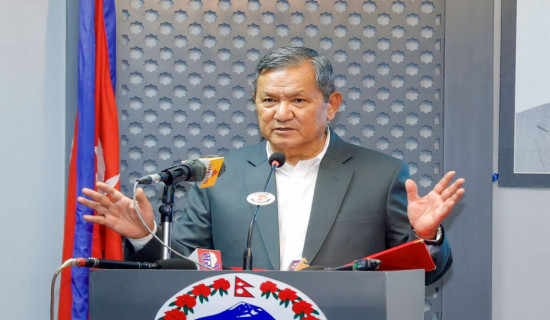- Thursday, 28 August 2025
Mindless Wars
Bishalya Gautam
Human conflict has changed over time, moving from ape-like battles for survival to contemporary violence that is often driven by territorial claims. Early conflicts were centered on resources, whereas modern conflicts mostly concern territorial expansion and geopolitical power, reflecting the intricate processes guiding civilisation's path.
People often criticise wars, yet admire ancient conquerors, revealing a conflicting view of violence. Many have questioned why wars happen, but finding a clear answer remains difficult. Certain conflicts find clear justification when undertaken to thwart tyranny or combat menacing political ideologies. The Allied invasion of German-occupied territories in Europe during World War II exemplifies a morally imperative action. Confronting the threat posed by the Axis powers, this intervention aimed at liberating oppressed nations and countering the expansion of an oppressive regime, making it an essential and ethically justifiable act for many people.
Some wars, such as the invasion of Iraq by the United States and its allies, give rise to concerns about exaggerated explanations by powerful states. The alleged necessity, which is based on the discovery of weapons of mass destruction, is not well supported. This draws attention to the potential abuse of power, raising doubts about the real motivations behind these interventions and highlighting how crucial it is to carefully consider the justifications offered for using force.
Moreover, as seen by Tsar Nicholas II's outbreak of the Russo-Japanese War, wars can be skillfully employed to resurrect popular support during periods of governance crisis. But this popularity-seeking stunt backfired, humiliating the Tsar. This emphasises the unpredictable outcomes and possible dangers that could arise when nations use conflict to gain political leverage during their vulnerabilities.
Innumerable violent acts throughout history have raised a complicated and nuanced question of who suffers the most. Throughout hostilities, citizens, soldiers, and entire towns are among the victims. Violent events have long-lasting effects that highlight their pervasiveness, such as loss, displacement, and trauma. Ultimately, the circumstances and dynamics of every historical conflict have an enormous effect on the degree and nature of suffering.
Even in the most distinct historical situations, atrocities are a common experience that unites people. Morally reprehensible acts, such as war crimes, and human rights abuses, are not limited to particular conflicts. These acts cause great suffering and leave a legacy of psychological and physical damage, whether they are directed at combatants or civilians. These parallels demonstrate the importance of addressing moral questions on the longstanding human cost of violence.
The validity of Russia's recent invasion of Ukraine, which Vladimir Putin defended as an essential step to stop oppression of ethnic Russians in Ukraine, has come under scrutiny. In a similar vein, the Israel-Hamas war is intertwined with complex theological issues and raises the possibility of ethnic cleansing, yet no one is able to look to the facts.
In summary, the quest of peace has to take precedence over the turbulent course of conflict. The blood of innumerable lives lost in countless wars serves as a constant reminder of the irrevocable cost of humankind. Generations later, the effects of war, which is frequently caused by flawed beliefs or political ambitions, linger. It becomes essential to embrace communication, understanding, and diplomacy to end vicious cycle of wars. Considering the damage done to individuals, families, and societies, we must all make a commitment to promoting a world in which disagreements are settled amicably and cooperatively rather than using the destructive machinery of war.

















